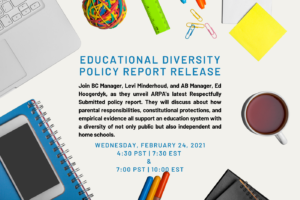ARPA’s Newest Policy Report: Educational Diversity
“Train up a child in the way he should go; even when he is old he will not depart from it.” ~ Proverbs 22:6
The central importance of Christian education in the life of Reformed Christians inspired ARPA’s latest – and perhaps long overdue – Respectfully Submitted policy report on the topic of Educational Diversity.
God commands parents to raise their children in the fear of the LORD and to pass along the covenant promises to their children (Deuteronomy 6:7, 11:19, Joshua 4:7, Exodus 12:26-27). Reformed thinkers such as Louis Berkhof have frequently raised the idea of the antithesis in education, the idea that there cannot be “neutrality” in the field of education; a system of education will either reinforce a Christian worldview or promote a non-Christian worldview.
The purpose of the Educational Diversity policy report is to carve out space for Christian education to flourish in Canada. By promoting a diversity of educational institutions based on the values or preferences of parents, this policy report aims to increase public acceptance of Christian education. It provides well-articulated reasons as to why provincial politicians, local school boards, and individual school administrators – both Christians and non-Christians – should embrace a diversity of educational institutions.
Why support diversity?
The foundation of our position is that parents have a unique responsibility to direct the education of their children. Current educational policies minimize parental involvement and responsibility in education. By failing to support alternative public, independent, and homeschooling options, provincial governments across Canada are inappropriately assuming responsibility that belong to parents. Returning that responsibility to parents will result in a diverse education system in which public schools, Christian schools, independent schools, distance learning programs, and homeschooling alike can flourish.
The second argument in favour of a diversity of educational institutions is that our legal and constitutional system supports educational diversity. The Charter of Rights and Freedoms guarantees the fundamental freedom of association and religion (section 2(a) and (d)) and directs that all rights and freedoms be aimed to enhance the multicultural heritage of Canadians (section 27). This forms a solid constitutional basis for supporting independent schools operated by like-minded parents.
The third rationale as to why politicians should support a diverse educational system is that it improves the quality of children’s education. By meeting the varied needs of unique subsets of students and by introducing an element of competition, a diverse school system has been proven to improve test scores, increase graduation rates, and increase university application rates, particularly for disadvantaged segments of the population. A diverse educational system with numerous Christian schools, French immersion schools, distance learning programs, specialty schools, and homeschooling is objectively better than a school system in which every student attends a cookie-cutter public school.
Recommendations
In light of these arguments, ARPA recommends that provincial governments implement the following policies:
- Enshrine in provincial legislation the right of parents to select schooling for their children in line with their religious, philosophical, or cultural commitments or traditions.
- Increase parental involvement in education by requiring schools to make all curricula publicly available, to encourage parental review of curricula and classroom settings, and to invite parental participation in the extra-curricular activities their children are involved in.
- Allow more choice among public schools by opening catchment boundaries, providing an adequate number of spaces for out-of-catchment students, and offering a greater number of public French immersion, charter, alternative, and distributed learning schools.
- Allocate education funding according to a per-capita formula for all public school, independent school, and homeschooled students.
- Require the “flow-through” of any federal per-capita student funding to follow the students, whether they are attending public schools, independent schools, or home schools.
- Decentralize decisions over budgeting, hiring, curricula, pedagogies, school policies, and religious or philosophical orientation to local school boards and individual school administrative staff.
Collectively, these policies will preserve or enhance the accreditation, independence, and financial support of all schools, but particularly independent Christian schools.
What can you do?
Over the coming weeks, we will be sending every provincial MLA and MPP and select local school trustees a copy of this policy report. Once a copy of the report is in their hands, reach out to them and encourage them to make these policy recommendations a reality.
Until then, we invite you to join our British Columbia and Alberta Managers, Levi Minderhoud and Ed Hoogerdyk, on Wednesday, February 24th for a webinar discussing this newest Respectfully Submitted policy report. Register by clicking on the image below!
